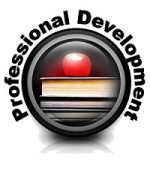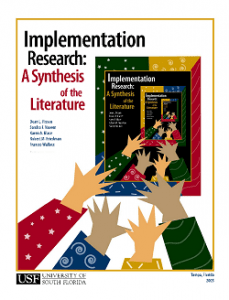Designing Effective PD for Teachers

Keys to Literacy draws on a large body of research about effective design of teacher professional development. Collectively, this research is often referred to as “Implementation Science”. This post is devoted to sharing resources for this research.
The ultimate goal of literacy professional development for teachers is for students to improve their reading and writing skills. Before this goal can be met, three stages must be completed:
- Quality professional development must be provided.
- Teachers must leave the professional development with improved knowledge and skills.
- Teachers must apply that knowledge to improve their instructional practices.
The graphic below illustrates how these stages lead to improved students results.
Implementation science research has identified a number of effective practices for providing professional development that addresses all three of these stages.
A seminal report (Wei et al, 2009) was issued by Learning Forward (formerly called the National Staff Development Council) titled “Professional Learning in the Learning Profession: A Status Report on Teacher Development in the United States and Abroad”. Access a 3-page summary I developed of the report: Summary of NSDC PD Report. The full report can be accessed here.
Here are some of the best practices identified in the report:
- Professional development content should focus on the ‘concrete’ tasks of teaching rather than abstract discussions of teaching.
- The context for providing the PD is important:
- PD is more effective when it is a coherent part of a school’s reform efforts.
- PD should be grounded in and intertwined with teachers’ ongoing practice.
- Opportunities for teacher collaboration during initial and follow up PD are essential.
- School-based, peer coaching is essential to help teachers apply instructional strategies that are learned in initial PD. Coaching is the key to providing effective, long-term follow up that is necessary to help teachers incorporate improved instructional practices both in the short and long-term.
- The design of PD experiences must address how teachers learn:
- Opportunities should be provided for active learning, including modeling of sought-after best practices and time for teachers to practice and reflect on new strategies.
- PD must be intense and sustained over a period of time.
- Professional communities should be established that enable teachers to visit and observe each others’ classrooms.
- PD that includes analysis of student work and assessment data is highly effective.
Another report that Learning Forward made available in 2014 was Designing Professional Learning, developed by Learning Forward and the Australian Institute for Teaching and School Leadership. This report provides a framework for understanding and designing effective, engaging professional learning for teachers. The information is organized into three topics: Environment (participants, conditions), Delivery (structure, accessibility, aesthetics, content, features, tools), and Action (transference, flexibility).
Some of the best implementation science material is available through the National Implementation Science Research Network and the State Implementation & Scaling-up of Evidence-based Practices Center, both founded by Dean Fixsen and Karen Blase.
Fixsen, Blase and colleagues 2005 report Implementation Research: A Synthesis of the Literature is the best synthesis of educational PD implementation findings that I have found. And the more recent 2013 Stages of Implementation Analysis: Where Are We? provides updated information.
Thomas Guskey and his colleagues have also written some very helpful articles related to effective PD:
- What Works in Professional Development?
- Does It Make A Difference? Evaluating Professional Development
- A Conversation with Thomas R. Guskey
I hope you will access the resources I have provided related to effective PD. The need for improved student literacy skills is huge, and increased knowledge of teachers through effective professional development is the key to growing those skills.


 Joan Sedita is the founder of Keys to Literacy and author of the Keys to Literacy professional development programs. She is an experienced educator, nationally recognized speaker and teacher trainer. She has worked for over 35 years in the literacy education field and has presented to thousands of teachers and related professionals at schools, colleges, clinics, and professional conferences.
Joan Sedita is the founder of Keys to Literacy and author of the Keys to Literacy professional development programs. She is an experienced educator, nationally recognized speaker and teacher trainer. She has worked for over 35 years in the literacy education field and has presented to thousands of teachers and related professionals at schools, colleges, clinics, and professional conferences.
Leave a Reply